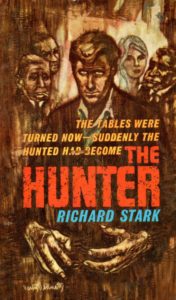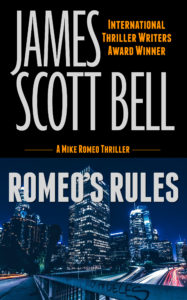by James Scott Bell
@jamesscottbell
 In my writing workshops I talk about three kinds of lead characters: the positive, the negative, and the anti-hero.
In my writing workshops I talk about three kinds of lead characters: the positive, the negative, and the anti-hero.
The positive lead is the traditional hero. This is someone who operates according to the shared morality of the community. It might be an ordinary man or woman who gets caught up in extraordinary circumstances (e.g., Tell No One). Or, it could be a hero with skills, like Jonathan Grave or Liam Neeson in Taken.
We root for positive leads because they represent us in the fight against evil and bad guys.
The anti-hero is someone who has been divorced from the community for some reason. They usually live according to their own code. The plot involves them being dragged into some trouble happening within the community. The story question then is: will they be reconciled to the group, or once again assume the role of outcast?
Rick in Casablanca begins the film sticking his “neck out for nobody.” Gradually he is pulled into a Nazi resistance scheme. At the end, he rejoins the community and the war effort. Ethan Edwards in The Searchers comes in from the wilderness and gets involved in finding his niece, who has been taken captive by Comanches. At the end, in one of the most memorable shots in movie history, he once again is consigned to the wilderness again.
Then there is the negative lead. This is someone who is engaged in an enterprise that offends our collective morality. The quintessential example is Ebenezer Scrooge, but also many of the leads in crime and noir fiction, such as Jack in The Vengeful Virgin, a book I wrote about last week. Indeed, some of the most popular fiction out there is about negative leads. Gone Girl anyone?
So what’s the secret to this kind of story? I’ve identified eight motifs in this regard:
- The Slow-Motion Car Wreck
You know how people are (including you). You’re on the freeway and there’s a big wreck ahead, even on the other side of the median. Flashing lights and crunched metal. You slow down a bit for a look. It’s human nature.
A book about a negative lead can be like the wreck itself, in slo-mo. I think of Scott Smith’s A Simple Plan, where the lead, his brother and a friend discover a crashed plane with a big stash of drug money. Should they report it? Or try to keep it? And when they decide to keep it, will they be able to sustain the secret without bringing disaster upon themselves and their loved ones?
I remember reading the book and actually saying out loud, a couple of times, “Don’t do that … please don’t do that!” And then they do it. I had to turn the pages, watching this wreck, hoping against hope that these guys wouldn’t descend further into the darkness.
- The Redemption Hope
Another reason to read about a negative lead is hope for their redemption. This is the way it is with Scrooge as he starts to get his angel visitations. It’s also what happens with Scarlett O’Hara in Gone With the Wind.
The key to this kind of story is to show us, early on, that the character has the capacity for moral change. With Scrooge, it begins to happen when he is taken to his boyhood past, his loneliness at school. It brings out deep emotion in Scrooge. There’s a heart in there after all! We read on to see if that heart can be warmed again.
With Scarlett, it’s her moxie, her guts, her strength. Like when she defies polite society by dancing with Rhett while she’s supposed to be in mourning. She uses her spunk selfishly most of the time. If only she can turn it in the right direction before it’s too late! If she does, frankly, we would give a damn. So we read on.
- Inner Turmoil
Sometimes, seeing what the wrong choices do to the inside of a character makes us want to find out what happens. Witnessing the emotional turmoil of a character automatically triggers our interest, because we experience it ourselves all the time.
In The Vengeful Virgin, Jack Ruxton is a knot of conflicting emotions once he falls for the alluring Shirley Angela and the two hatch a plot to murder the old man she cares for. Brewer gives us the insides of Jack throughout, as in:
Doom. You recognize Doom easily. It’s a feeling and a taste, and it’s black, and it’s very heavy. It comes down over your head, and wraps tentacles around you, and sinks long dirty fingernails into your heart. It has a stink like burning garbage. Doom. I sat up all night with the lights on. Waiting.
Passages like that kept me going, even though what Jack was doing was immoral. There’s a sort of catharsis in seeing massive inner conflict in someone else. We can put our own on hold while we’re reading!
- Comeuppance
This idea applies when we read about a real crumb. We want him to get his just desserts. He deserves to go down.
Once again, I turn to The Vengeful Virgin, because there’s a point in the middle of the book where any sympathy we might have for Jack is wiped out. His jilted lover, Grace, keeps hounding him, and getting in the way of his plans with Shirley. Grace is not a bad person, just stupidly in love with the guy.
She surprises him one night outside Shirley’s house. He’s so outraged he hits her. Hard. Staggers her. Then hits her again. Then twists her arm behind her back and shoves her into her car.
This disturbing turn makes us want to see Jack get what he deserves. (**Spoiler alert** … if you plan to read The Vengeful Virgin, skip down to #5.)
In an ending that rivals, perhaps even surpasses, Jim Thompson, Jack Ruxton, guilty of two murders, is shot by a drunken and envious Shirley, who then turns the gun on herself. She dies, but he survives, only to be arrested, tried, and sentenced to the electric chair. The last lines:
Yes, that’s how it was. Grace, she was always burning. Then Shirley and I began burning. And then the money burned. And now there was time to burn.
Then, after there was no more time, they would burn me.
- Love Conquers All
With a hat tip to Huey Lewis, there’s just something about the power of love. Especially in noir. In films like Gun Crazy and They Live By Night, doomed lovers grab our hearts even though we know it won’t end well. It can’t. In the moral universe of noir, you pay for your sins.
James M. Cain’s classic The Postman Always Rings Twice bonds us to the murderous couple. Drawn first by lust, by the time the book gets to the end, the two are truly part of each other. There’s poignancy on the last page as Frank Chambers awaits his appointment with the electric chair (Old Sparky is a familiar last stop in these books!):
Here they come. Father McConnell says prayers help. If you’ve got this far, send up one for me, and Cora, and make it that we’re together, wherever it is.
- At least he’s better than the other crumbs
One of the hardest of the hardboiled writers was Richard Stark, pen name of prolific author Donald Westlake. He created Parker—thief, killer, heist man. Not a shred of sentimentality in this guy. So why do we root for him? In the first book, The Hunter, Parker has been double-crossed and left for dead after a heist. He goes after the money he’s owed, taking on “the outfit” (the crime syndicate) to get it back. Not the whole stash, you understand. Just his half of it.
In other words, compared to the other criminals involved, Parker’s cause is “just.” It’s a remarkable feat, which is why no less than seven movies have been made about this character (the two best are Point Blank and Payback}.
- Such a charmer
Tom Ripley, the protagonist of several novels by Patricia Highsmith, has been described as “charming, literate, and a monster” (Roger Ebert). Also “a likable psychopath.” Talk about a challenge! Yet Highsmith pulls it off.
- Will They Get Away With It?
Finally, we sometimes read or watch a criminal caper story and actually find ourselves hoping, just a little (or maybe even a lot), that the negative leads get away with it.
My favorite film example is The Asphalt Jungle. Directed by John Huston, the film is about a group of thieves coming together to pull off a big heist. There’s a sympathy factor in operation for each of these desperate men, and you find yourself pulling for them even as the cops pull the net tighter and tighter. It’s really one of the great crime films of all time, with a memorable early appearance by Marilyn Monroe.
Okay! Let’s open this up. What’s your favorite book or movie about a negative lead? What made it work for you?
***
BTW, if you want to get in on the ground floor of a series with a hero, try ROMEO’S RULES

